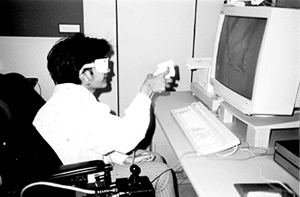Director's Digressions

By 5 p.m. Friday, August 20th most of the DO-IT participants had packed up their new knowledge and their fond memories and had headed home. The participants, 16 high school kids with disabilities, spent two weeks at the University of Washington studying math, engineering and science. They seemed to enjoy their stay and we enjoyed working with them.
Although we knew that all of the students were disabled, bright and interested in science, staff who survived a night or two as dorm keepers in McCarty Hall learned the truly interesting tidbits about the DO-IT kids.
Who would have known that Katie has quite a pitching arm or that Randy has a joke for every occasion? We discovered that Hollis is a card shark, that Shane is a ladies' man and that Rachel is a matchmaker. Anna is a latte fiend and Rodney craves chocolate, but Nhi, who is very sweet, doesn't crave sweets at all. Ryan made some prime slime and Nadira discovered the Internet as an art source. Mitch's view is skewed and Mark's is focused on the stars. Lloyd will only ride a Harley and Eric can imitate that sound as well as almost any other motorized vehicle.
The participants had a taste of college life as they slept in the dorms, ate in the cafeteria and socialized in the student union building. Campus tours and interaction with university students with disabilities helped them learn the ropes of attending college as a disabled student. But for the most part, they attended classes.
Look inside this issue to find articles about the labs and lectures written by the participants. Not only are the DO-IT kids proficient at math, science and engineering, but they are keen observers, too. Evidence of this is shown in their writing as they documented important details and complex concepts.
The participants learned about earthquakes and estuaries, but they also learned how to work in teams, how to build on their strengths and how to compensate for their weaknesses. A wide range of disabilities were represented--visual, hearing, mobility and speech impairments, as well as learning disabilities and attention deficit disorders. The students helped each other. For example, participants in wheelchairs helped guide the blind students across campus and the blind students helped manipulate objects and dials for those who could not use their hands. This teamwork was an important element of the program.
The summer session is over, but DO-IT is just warming up. This year's participants continue to communicate on the Internet and work on individual research projects.
Next year, a new group of students will attend the summer study sessions and will be assisted by the 1993 participants. We look forward to the upcoming activities and thank participants, staff, faculty and volunteers for making this, the first DO-IT summer study program, a success.